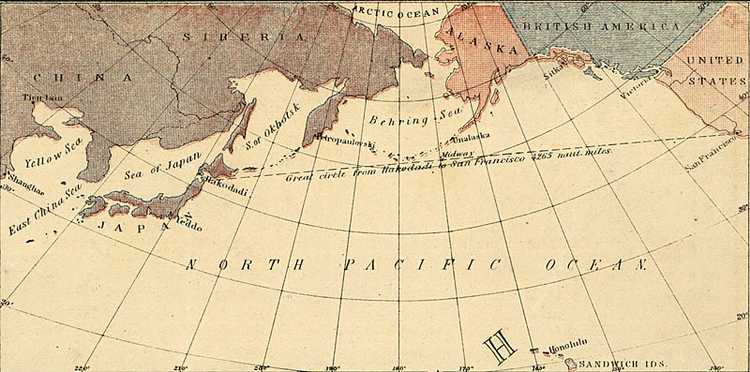William Seward and Alaska
- supported Sen. William Gwin's proposals to survey the Bering Strait 1852 and purchase Alaska 1860
- supported Edward Stoeckl and the "strange friendship" with Russia 1854-1869
- supported U.S. subsidy of Perry Collins and his Intercontinental Telegraph 1856
- Collins sought to develop trade with Amur River of eastern Russia, especially after Russian treaties with China in 1858 and 1860 gained control of Ussuri and Amur Rivers and Vladivostok. Russia was willing to give up Alaska to focus on development of East Asia.
- Seward appointed Collins as a commercial agent to Russia 1861 to build telegraph, rights granted by Russia in 1863, and right-of-way in Canada from Britain 1864, and from China 1864, and from Brazil 1865
- Western Union invested in Collins' plan and created new company the Western Union Extension with stock given to "friends" such as Baron Stoeckl and Cassius Clay, but Western Union ended project after rival Cyrus Field completed Atlantic Cable 1866.
- Apr. 16, 1866, Czar Alexander assassination attempt by student Karakozov
- Sumner sponsored resolution praising "Great Emancipator" and sent Asst. Secretary of the Navy Gustavus Fox in theMiantonomoh, one of the Navy's new monitors, to the port of Kronstadt to deliver resolution to Czar, stayed for 40-day tour of Russia
- Joseph Lane McDonald petition that had been sent to Washington territory legislature for Alaska fishing rights was used by Seward to propose purchase to Baron Stoeckl who returned to Russia in Oct. 1866
- Czar decided to sell Dec. 16, 1866, for at least $5m, and American friendship vs. British
- Stoeckl arrived in U.S. March 1867 and began negotiations with Seward, ending at 4 am March 30 with signing ceremony (Sumner did not attend)
- Seward himself raised the selling price to $5.5m, then to $7m, then to $7.2m., but not "after considerable haggling"
- treaty sent to Senate 6 hours later
- Seward's "domestic diplomacy" was important to Senate passage
- planted favorable stories in nespapers (except Greeley's NY Tribune, that called it "Seward's icebox")
- got supporting letters from Gen. Montgomery Meigs, Gen. Henry Halleck, Commodore John Rodgers
- scientific witnesses at Senate Foreign Relations Committee hearings testified to the value of Alaska, but William Fessenden joked: "I'll go for it with an extra condition that the secretary of state be compelled to live there and the Russian government be required to keep him there."
- Thaddeus Stevens helped win Radical Republican support for the treaty
- Sumner's key 3-hour speech on Apr. 8 - all 50,000 words printed in the newspapers.
- Senate voted Apr. 9 to pass the treaty 73-2 (Morrill of Vermont and Fessenden of Maine opposed)
- see the text of the treaty at Yale's Avalon collection of documents.
- formal transfer ceremony took place at Sitka on Oct. 18, 1867
- but House delayed passage of $7.2m appropriation bill and postponed it until after the Feb. 1868 impeachment crisis
- Stoeckle paid lobbiest Robert J. Walker $20,000 to win support of House
- bribes given to Stanton, Banks, Stevens, and others
- House voted July 14 to pass the appropriation bill 113-42
- on Aug. 1, $7,035,000 was deposited to Russia's Baring Bros. account, after Stoeckl deducted $165,000 for the bribes and lobbying expenses.
Links:
Sources:
- Ronald Jensen, The Alaska Purchase and Russian-American Relations, New York, 1975.
- Paul S. Holbo, Tarnished Expansion : the Alaska Scandal, the Press, and Congress, 1867-1871, Knoxville : University of Tennessee Press, 1983.
- Ernest N. Paolino, The Foundations of American Empire, New York, 1973.
revised 8/15/05 by Steven Schoenherr at the University of San Diego | Seward |pictures -->
